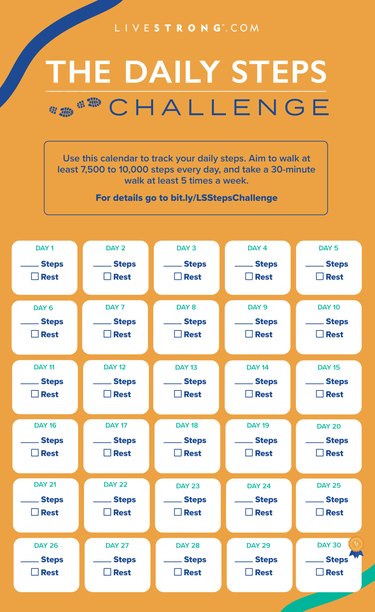

Getting and staying active doesn't have to involve expensive gym memberships, fancy equipment or complicated exercises. It can be as straightforward as walking. Moving around is vital to your physical and mental health — especially if you find yourself sitting a lot during the day.
To help keep you committed to walking more throughout your day, join the LIVESTRONG.com team for our Daily Steps Challenge. We finished our latest round of the challenge in May 2023, but you can do this challenge on your own anytime.
Video of the Day
Video of the Day
Your Goals for This Challenge
- Aim to walk at least 7,500 to 10,000 steps every day. If you can't quite get there, that's OK! Focus instead on walking a little more each day than you're used to.
- Take a 30-minute walk at least 5 times a week.
Why 7,500 to 10,000 Daily Steps?
The idea that you should take 10,000 steps a day is practically wellness gospel, nearly as universal as the idea that you should drink 8 glasses of water daily. But both of those benchmarks are a bit oversimplified.
There's actually stronger evidence the health benefits of walking — including improved mood, better heart health and stronger knees — level off at about 7,500 steps a day, according to a May 2019 JAMA Internal Medicine study.
A March 2022 review in Lancet Public Health had similar findings. Looking at more than 47,000 people internationally, the review found mortality risk was lowest at 6,000 to 8,000 steps for people over the age of 60 and 8,000 to 10,000 steps for younger people.
So don't worry if you don't reach 10,000 steps each day — or even 7,500, for that matter. Instead, focus on what these goals represent: moving your body regularly.
If you already use a pedometer or other step tracker, check how many steps you're currently taking on an average day. If you're not tracking steps, use the first day of the challenge to get an idea of how much you're walking without really pushing yourself.
For most Americans, that number is between 3,000 and 4,000 steps, according to the Mayo Clinic. Jot down your baseline so you can measure your progress throughout the month. There will likely be days you don't get much beyond your baseline — we get it. Remind yourself to set reasonable goals based on your unique circumstances.
And remember the intensity of your walks matters, too. The Physical Activity Guidelines for Americans recommend at least 150 to 300 minutes (that's 2.5 to 5 hours) of moderate-intensity aerobic activity (think: any walking that gets your heart beating faster) each week.
That's why we've made it part of the challenge to take a 30-minute walk at least five times a week. Depending on your pace, that 30-minute walk can add roughly 2,000 to 3,000 steps to your day, according to Gundersen Health System.
Related Reading
How to Join the Daily Steps Challenge
1. Find a Way to Measure Your Daily Steps
You can wear a fitness tracker on your wrist, clip a pedometer to your clothes or carry your phone with you to count your steps. If your smartphone doesn't come with a built-in health app to monitor your movement, try downloading a walking app for free. You may also want to invest in a supportive, comfortable pair of walking shoes.
What if You Move Differently?
We recognize not everyone takes traditional steps or can take more steps than they're already taking. You can still follow along with this challenge by finding ways to move more that work for you. Learn more with our guide to tracking your daily activity if you use a wheelchair.
2. Print and/or Save Your Challenge Calendar
Print out the calendar below or save it to your phone and fill in your steps each day to help you stay on track and monitor your progress.
Get a printable version of the calendar above here.
3. Join Our Challenge Facebook Group

Our community of more than 57,000 members is here to support and motivate you through this challenge. Share your progress by posting screenshots of your step-counting app, photos of your fitness tracker or views from your daily walk — or simply tell the group how the day went.
4. Find Creative Ways to Log More Steps
No matter your baseline number, focus on walking a little more each day. Swap your water bottle for a small glass so you have to get up more often to refill it, or park farther away when you're running errands. These and other creative ways to take more steps can help you reach your daily goals.
Tip
Program your wearable to remind you to get up and move when you’ve been sitting still for 20, 30 or 60 minutes. Or set an alarm on your phone for the top of every hour and take a quick walk around the block, the floor or the room.
5. Celebrate Your Success
As the month goes on, look back at your baseline and congratulate yourself for the progress you've made!
Then, if you're up for it, consider trying a new challenge next month, such as:
You can do any of our challenges on your own whenever you want, or you can visit our Challenges page to see what we have planned for the full year.
- The BMJ: "Physical activity trajectories and mortality: population based cohort study"
- Mayo Clinic Proceedings: "Comparative Relevance of Physical Fitness and Adiposity on Life Expectancy"
- International Journal of Obesity: "Time Spent in Sedentary Posture Is Associated With Waist Circumference and Cardiovascular Risk"
- JAMA Internal Medicine: "Association of Step Volume and Intensity With All-Cause Mortality in Older Women"
- U.S. Department of Health and Human Services: "Physical Activity Guidelines for Americans"
- Gundersen Health System: "Pedometer Conversion Chart"





